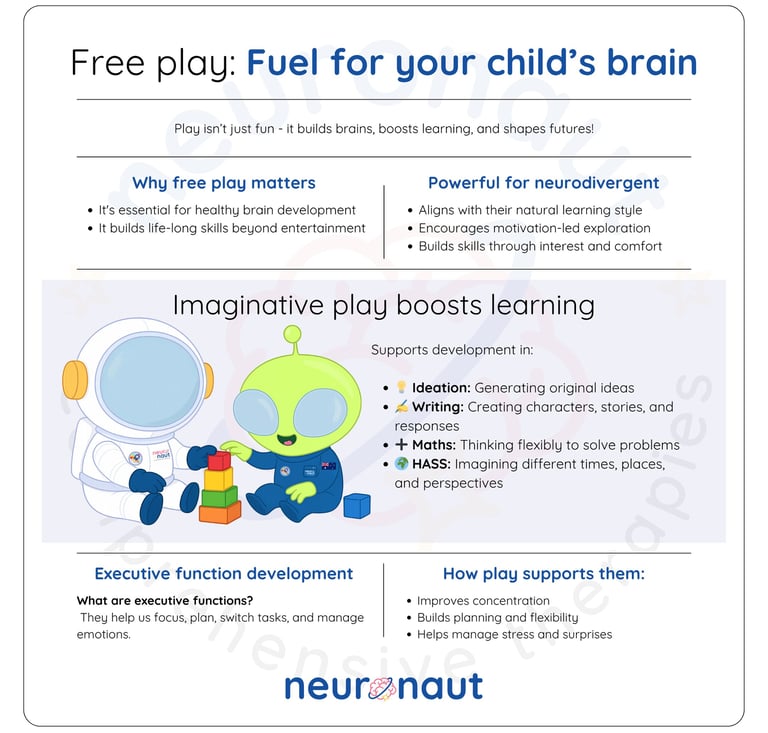The power of free play in brain development
Free play isn't just fun; it's essential for brain development. It helps children build creativity, problem-solving skills, emotional regulation, and social connections, all while exploring the world at their own pace.
Lily Vesty
6/24/20253 min read
This perspective is informed by a training I attended with Maude Le Roux, OTR/L, SIPT, CTC, ADHD-RSP focused on Evidence based practice on use of play and effect on development in therapy settings in Melbourne, 2023.
As Occupational therapists, we often hear, all you do is play all day, or parents that are worried about their child play rather than doing their Maths or handwriting homework. What if I told you that play is a fundamental developmental skill, that helps across all areas of your child’s day to day and in addition sets them up for an amazing future?!
Sounds too good to be true, right? Well thankfully in this case, and let me explain why. As Occupational therapists we are so obsessed with play. Yes, I will admit that part of it is that I do love being able to play all day, but I promise that there is good reason as to why.
In this article, we’ll cover:
Why play is not “just play” it’s a powerful developmental tool
How imaginative play boosts your child’s ability to generate ideas (ideation)
The connection between ideation and academic success in writing, maths, and humanities
The role of play in building executive function skills like focus, planning, and flexibility
Why play-based learning is especially powerful for neurodiverse children
How Occupational Therapists use play as evidence-based practice in therapy
While traditional learning methods with a focus on memorisation and assessment do help with learning, there are crucial developmental stages that are completely neglected, which alone will not set your child up for future success.
Sometimes I struggle to understand why children are forced to sit and go through the mundane style of learning, when play and interest lead learning, especially for Neurodiverse children, is a much more powerful way of learning, and encompasses such a wide range of developmental levels and skills. As a paediatric OT I could talk about this all day, but today I will just focus on a few key concepts starting with; Development of ideation through imaginative play.
When your child uses their imagination during play, just like when they pretend to be an astronaut in outer space, or spiderman saving the day, their brain is working super hard and making all sorts of amazing development and connections. Imaginative play helps your child to think of or come up with new ideas. In occupational therapy we call this ideation.
Okay but if my child develops ideation will this actually help with schoolwork?
The answer is yes! Here’s just a few ways that ideation will help your child academically:
Writing and storytelling
Your child needs ideation to figure out what they want to write about before they can even put pen (or pencil) to paper. Whether it’s writing a story or answering a writing prompt, they need to be able to think of characters, settings, or ideas first.
Maths and problem solving
Problem-solving is more than just getting the right answer. It’s being able to look at a challenge and say, “Hmm, what could I try?” Ideation helps your child to think flexibly which a fundamental part of learning maths.
Humanities and Social Sciences (HASS)
Ideation helps your child imagine what life was like in the past, in different places, or for different people. It also helps them come up with questions, ideas, and solutions during classroom projects. In HASS, your child might need to design a map, build a model, write a short report, or suggest ways to improve their community; and you guessed it! Ideation gives them the creative thinking skills to do all of that.
Play helps your child develop fundamental cognitive and executive function abilities:
Executive functions are our brains magic organisation and control centre, it helps with focusing, planning, switching between tasks, and staying calm under pressure.
Play is full of surprises and changes, so it helps kids grow flexible, creative brains. That’s why even short play breaks improves concentration for children.
Development of executive functions will help your child excel in all subjects at school and sets them up for a better future.
Now, that’s just a small part based on how play supports development of academic skills, I haven’t even got onto social and other life skills yet! Stay tuned and let us know if this helped or if you have any questions or anything you would like to learn more about!
If any of these sound familiar, we’re here to help!


Need support? Get in touch!
Have questions? Feel free to reach out or drop them in our question block below—we’d love to help!
If you think your child would benefit from working with an occupational therapist, feel free to fill out our referral form, and we’ll be in touch to support you on this journey.
Join the conversation
If this article has inspired you or raised questions, we’d love to hear from you. Share it with others who might also benefit from these ideas and help us spread the message further.
Together, we can celebrate differences and build a society that embraces neurodiversity in all its forms.
This content has been created for informational purposes only and should not replace professional evaluation. The article has been reviewed by our editorial team.
References
Le Roux, M. (2023). Evidence-Based Practice on the Use of Play and Its Effect on Development in Therapy Settings (Professional training session). Melbourne, Australia.
Do you have a comment?

Find us here
258 Warrigal Road, Glen Iris, VIC 3146
Follow us


ABN 93673889506
Member of UniHub Monash University

Call us

We acknowledge the Traditional Aboriginal Owners of Country and pay our respects to them, their connections to land, sea, and community. We pay our respects to their Elders past and present and future Traditional Owners.
We respect and welcome people of all backgrounds, genders, sexualities, abilities and cultures.


